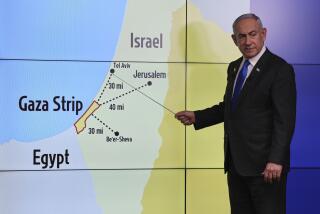Slow Going in Talks on Hebron
- Share via
The first week of renewed Israeli-Palestinian negotiations on the status of the West Bank city of Hebron has ended with, at best, minimal progress. The sticking points continue to be Israeli Prime Minister Benjamin Netanyahu’s insistence that new security measures be adopted in an effort to better protect the 400 or so militant Israelis who live among 100,000 Palestinians in Hebron, and Palestinian leader Yasser Arafat’s determination that the arduously negotiated accords governing the peace process not be tinkered with. It’s hard to argue with that principle; once exceptions to an agreement begin to be made, the agreement’s political and legal integrity inevitably comes into question. But saying this does not rule out arriving at ad hoc arrangements outside the framework of the basic accord.
Netanyahu says the recent incidents of Palestinian policemen turning their weapons on Israeli soldiers show why new rules on police behavior in Hebron have to be written. In fact, months ago, long before the latest troubles erupted, Netanyahu was demanding changes in the agreed-on provisions for turning Hebron largely over to Palestinian control. Israel’s military pullout from Hebron was to take place last spring. If it’s delayed much longer, the peace process could end.
As with so much else in the Middle East, Hebron has come to be seen as more a symbol of competing goals than a practical problem to be resolved by good-faith efforts. Palestinians are determined to have the municipal sovereignty in Hebron they were promised. The Israeli government says its security concerns must be satisfied. Surely there is room here for creative compromises that would leave the basic structure of the accords unaffected. It would be an unforgivable failure of political courage if Israeli and Palestinian leaders can’t bring themselves to make those compromises.
More to Read
Sign up for Essential California
The most important California stories and recommendations in your inbox every morning.
You may occasionally receive promotional content from the Los Angeles Times.










